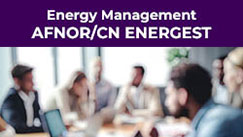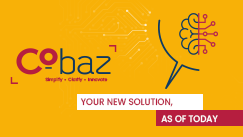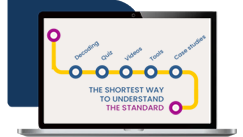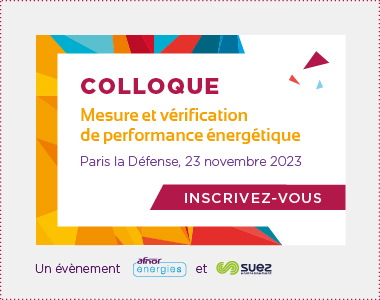There’s ISO 9001 for quality management, ISO 14001 for environmental management, and ISO 50001 for energy management! Available in France in the AFNOR collection under the title NF EN ISO 50001, this voluntary standard is a tutorial for managing energy in your organization, with the aim of continuously improving your energy performance. Born in 2011, it was updated in 2018, and ISO is now looking into the possibility of a new revision, to incorporate the latest market trends. Download the AFNOR guide “The essentials of ISO 50001 version 2018” here.
The 4 key points of ISO 50001
- Help build a consumption measurement plan and relevant monitoring indicators
- Demonstrates continuous improvement in energy performance
- Reliable energy savings and how to verify them
- Exemption from regulatory audit (DDADUE law)
ISO 50001 certification: proof of high-performance energy management
Two out of three consider the cost of the approach to be low in relation to the benefits it generates, according to a 2019 AFNOR study that you can download .
6 benefits of ISO 50001 certification
- Electrically-intensive industries: ISO 50001 = reduced TURPE.
- Companies with more than 250 employees: ISO 50001 = no energy audit required
- Energy efficiency service companies: ISO 50001 = credibility
- Local authorities: ISO 50001 = exemplarity.
- Tertiary sector: ISO 50001 = early phase.
- International: ISO 50001 = export passport.
ISO 50001: standards watch and FAQs
To make sure you don’t miss out on the latest updates to ISO 50001 and other standards in the 50000 family (ISO 50002, 50006, etc.), AFNOR offers you the opportunity to take part in the standardization committee on energy management, and to keep abreast of the latest texts thanks to its various standards and regulations monitoring tools.
What does ISO 50001 contain? How does it fit in with regulations? All the answers to your questions can be found in our FAQ.
Get inspired: ISO 50001 for industry
Numerous schemes exist to help manufacturers kick-start their energy transition. One of the most recent is ADEME’s Pacte Industrie program , whose Pro-SMEn component takes you towards ISO 50001 certification. Are you a manufacturer committed or ready to commit to ISO 50001 to structure your energy management? Listen to the replay of our webinars organized with ADEME, featuring witnesses presenting their best practices. And get inspired!
You can also download a collection of fact sheets compiling 18 success stories, free of charge, here .
Do you fall into the electro-intensive category, consuming more than 10 GWh of electricity per year, for example in the paper, metallurgy, chemical or cement industries? Your TURPE rate is reduced by 20% to 90%, depending on the case, if you are ISO 50001 certified.
Do you consume more than 85 terajoules per year on average over the last three years (i.e. 23.6 GWh)? From October 2027, the new Energy Efficiency Directive will require you to set up an energy management system based on the recommendations of ISO 50001. As has been the case since 2012, holding an ISO 50001 certificate allows exemption from the four-yearly energy audit .
ISO 50001: training to become an EMSn pilot and auditor
The voluntary ISO 50001 standard is a tool to structure your energy efficiency approach and help you identify potential savings. AFNOR Compétences, part of the AFNOR Energies offer with its Energy Efficiency training courses, provides an explanation of the text in the form of 2 to 8-day modules (plus e-learning), focusing on several key concepts of the standard, such as energy reviews and energy performance indicators (EPIs).
Exchanging: ISO 50001 clubs in the regions
The energy transition takes place in the regions! That’s why AFNOR Energies organizes regional clubs to encourage exchanges between peers, combining the sharing of theoretical practices with site visits.
Text explanations by a qualified auditor, energy diagnostics, energy management training, individual and group support to lay the foundations of a management system… The range is wide.
Auvergne-Rhône-Alpes, Bourgogne-Franche-Comté, Centre-Val-de-Loire, Nouvelle-Aquitaine, Occitanie… Join our regional clubs to discuss and benchmark ISO 50001… and, more broadly, energy and low-carbon solutions!
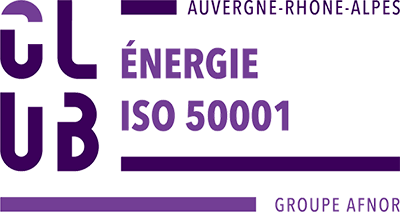
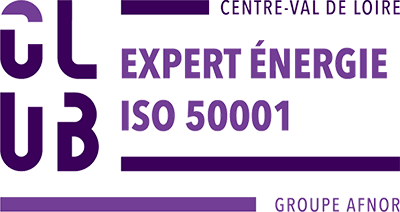
Key points to remember
- Energy management = ISO 50001 (AFNOR NF EN ISO 50001 collection)
- ISO 50001 = a tool to structure your energy efficiency approach
- ISO 50001 = a tool for identifying potential savings
- AFNOR Energies organizes regional clubs that provide a forum for sharing theoretical practices and site visits.


